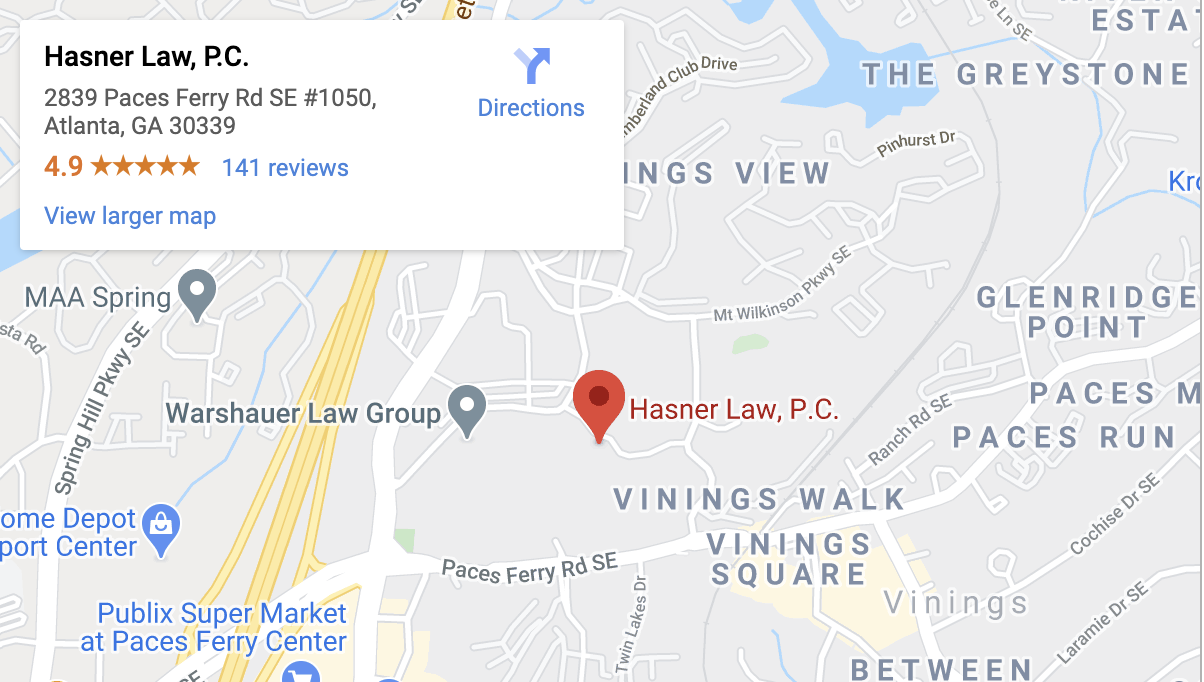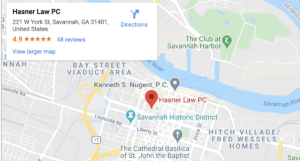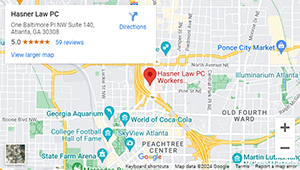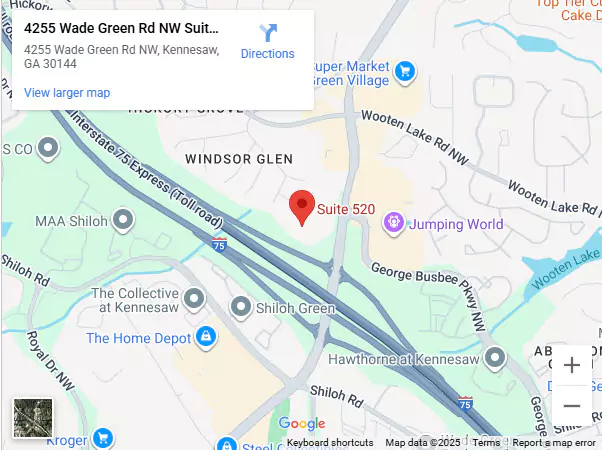Georgia Workers’ Compensation Lawyer
Key Takeaways About Workers’ Compensation in Georgia
- Georgia workers’ compensation laws require most employers with three or more workers to provide workers’ comp insurance, covering job-related injuries or illnesses. Exceptions include railroad, federal government employees, and agricultural workers.
- Workers’ compensation in Georgia offers medical care, disability benefits, and covers lost wages, but excludes injuries under substance influence, willful misconduct, and emotional trauma without physical injury.
- Denied claims can be contested through a hearing request, with evidence gathering and legal representation crucial for overcoming denials and securing deserved benefits.
- At Hasner Law Injury & Workers’ Compensation Attorneys, we have over 100 years of collective experience assisting injured workers in navigating claims, appealing denials, and fighting for comprehensive compensation, including handling third-party claims. Having a specialized law firm on your side is essential for navigating the complexities of the workers’ compensation system and maximizing your benefits.

Were you or a loved one injured while working in Georgia? You may be entitled to compensation for medical bills and lost wages. An experienced Georgia workers’ compensation lawyer at Hasner Law Injury & Workers’ Compensation Attorneys can protect your rights under state workers’ compensation and personal injury laws.
Collectively, our legal team has over 100 years of experience holding employers responsible for the damages they owe injured employees – and we’ve recovered millions of dollars in benefits on their behalf.
If you’ve been hurt on the job, please don’t hesitate to call our law office in Atlanta, Georgia at (678) 888-4878 to schedule a free consultation today.
How Can Our Workers’ Compensation Attorneys in Georgia Help With Your Claim?

There’s always the risk that you could be injured on the job. Unfortunately, sometimes your injuries or illness prevent you from working. That can put you in a difficult position.
Unfortunately, the process of recovering workers’ comp benefits can get tricky. You have to meet strict deadlines and worry about insurance rules and regulations. Your initial claim could even be denied or challenged. Our Atlanta workers’ compensation attorneys at Hasner Law Injury & Workers’ Compensation Attorneys have extensive experience in handling workers compensation cases and can help you achieve a successful outcome.
Hiring our experienced workers’ compensation lawyers means you’ll have a legal team dedicated to:
- Evaluating all options for recovering benefits.
- Assessing the value of your claim.
- Defending you if your claim is challenged or denied.
- Negotiating with the workers’ compensation insurance carrier on your behalf.
Our Georgia workers’ compensation attorneys specialize in protecting workers’ rights. Our founding attorney co-founded the Georgia Injured Workers’ Advocates (GWIA) and is Chairman of the Workplace Injury Network Political Action Committee.
Don’t take our word for it. Call to learn more about how we can put more than 100 years of experience to work for you.
Georgia’s Workers’ Compensation Laws
Georgia workers compensation law is crucial for both employees and employers to understand, as it governs the financial support provided to employees injured on the job, covering their medical bills, rehabilitation, and lost wages. In Georgia, it’s mandatory for businesses with three or more employees to carry workers’ comp insurance. However, there are several exceptions, including the following:
- Railroad companies
- Federal government agencies
- Agricultural workers
Georgia’s workers’ compensation laws benefit both employees and employers. In exchange for receiving workers’ compensation coverage, the employee forfeits their rights to sue their employer for their losses, even if they are at fault. However, injured employees may have the right to sue third parties like contractors if they contributed to their injuries and other losses.
Who Is Eligible for Workers’ Compensation in Georgia?
In Georgia, most employers with three or more employees must have workers’ compensation insurance to cover any injuries or illnesses that occur on the job. To be eligible for these benefits, you must meet the following criteria:
It is important to avoid giving recorded statements or signing any papers for your employer or insurance company without first contacting a workers’ compensation lawyer. By law, you are not required to provide a recorded statement to insurance agents or employers, and seeking legal assistance can help you navigate the process effectively.
1. Injury or Illness Related to Work
You can qualify for medical benefits if you are injured while performing your job duties, regardless of the location. This includes injuries from workplace accidents or illnesses caused by exposure to hazardous conditions. However, injuries or illnesses stemming from pre-existing health issues, like heart disease, may not qualify.
2. Employment Status
You’re eligible for workers’ compensation if you’re an employee of a company that withholds taxes from your paycheck. This applies whether you’re full-time, part-time, seasonal, salaried, or hourly. Workers’ compensation coverage starts from your first day on the job. There is no probationary period requirement.
While many individuals qualify for workers’ compensation benefits, there are several exceptions. Independent contractors and freelancers do not qualify as they’re not considered employees under Georgia’s workers’ compensation laws. If your employment status is misclassified, you may miss out on essential benefits. The skilled Hasner Law Injury & Workers’ Compensation Attorneys can review your case and review your eligibility and legal options.
How Common Are Workplace Injuries and Illnesses in Georgia?
In 2019, over 2.8 million work-related injuries and illnesses were reported to the U.S. Bureau of Labor Statistics. Over 5,300 people were killed on the job. In Georgia alone, 207 workers lost their lives in fatal workplace accidents.
According to data collected by the U.S. Department of Labor, 8,434 workers’ compensation claims were filed in Georgia during the first ten months of 2021. As of November 1, 2021, the state board of workers’ compensation had paid out more than $269 million in benefits to provide injured workers.
Hiring experienced Atlanta workers’ compensation lawyers is crucial for navigating the intricate workers’ compensation system and ensuring successful outcomes.
What Is My Georgia Workers’ Compensation Claim Worth?
Most Georgia employers are required to purchase workers’ compensation insurance.
The value of your claim will depend on a few different factors, including:
- Your average weekly wages
- The length of your recovery time
- The cost of your medical treatment
- Whether you’ll be able to work once you reach maximum medical improvement (MMI)
Your weekly cash benefits will equal ⅔ of your average weekly wages. In most cases, you can receive temporary workers’ comp benefits for up to 400 weeks.
The value of your weekly check is also subject to a state-mandated cap of $800 per week if you were injured after July 2023. If you’re able to work in some partial capacity, your weekly check could be even less.
We don’t have to tell you how important it is to get the full benefits you deserve after a work accident. At Hasner Law Injury & Workers’ Compensation Attorneys, we’re here to help you fight for every penny you deserve. To learn more, call our workers’ compensation attorneys in Georgia, for a free case review today.
What Types of Workers’ Compensation Benefits Are Available to Injured Workers in Georgia?

Workers’ compensation provides critical benefits to Georgia workers who are injured at work. Those benefits are primarily economic–they are meant to cover financial losses caused by the injury.
Several different types of benefits are available, including:
- Medical care
- Disability benefits
- Vision or hearing loss benefits
- Benefits to compensate for loss of the use of a body part
- Death benefits for survivors of fatal work accident victims
Do you have questions about the benefits you’re entitled to receive? Call our Georgia law firm for a free case evaluation today. Our Georgia workers’ compensation attorneys are standing by to help you fight for the maximum benefits available.
Medical Benefits
Georgia workers’ compensation covers all reasonable and necessary medical expenses to treat your injury or illness.
Benefits cover:
- Doctors’ bills
- Hospital bills
- Prescriptions
- Physical therapy
- Travel expenses to and from medical appointments
- Medical and vocational rehabilitation
However, to qualify for benefits, you are required to see a doctor that’s been approved by your employer.
Disability Benefits
Cash benefits are available to employees who miss at least seven days of work because of a work injury. Once your injury causes you to miss at least 21 days of work, you’ll also be retroactively compensated for the first seven missed workdays.
The type of disability benefits you receive will depend on the severity of your injury and your recovery time.
Available benefits include:
- Temporary total disability benefits
- Temporary partial disability benefits
- Permanent partial disability benefits
- Permanent total disability benefits
You should consider filing a claim as quickly as possible after your injury. That way, you can start receiving your benefit checks within a few weeks.
Can I Sue My Employer for Additional Damages?

Georgia workers’ compensation laws prohibit injured employees from suing an employer for damages. Instead, you’re entitled to workers’ compensation benefits, without any need to prove that your employer caused your injuries or illness.
Third parties aren’t entitled to the same protection. You may be entitled to file a lawsuit against negligent third parties who caused your injury or illness. These lawsuits are called “third-party claims.”
You may be entitled to file a third-party claim against:
- Property owners
- Negligent drivers if you were hurt in a car accident or truck accident
- Manufacturers of defective work equipment or vehicles
- General contractors
- Venders
- Suppliers
Workers’ comp benefits aren’t always enough to cover the full range of harm you’ve suffered. If you’re eligible to file a personal injury lawsuit, our workers’ compensation attorneys in Georgia can also help you seek benefits for:
- Past and future medical expenses
- The full amount of your lost income
- Reduced future earning potential
- Rehabilitation
- Property damage
- Pain and suffering
- Mental anguish
- Diminished quality of life
- Physical disfigurement
- Scarring
- Anxiety, depression, or PTSD
- Loss of consortium
You can count on our workers’ compensation attorneys to pursue all types of damages that may be available. That includes non-economic damages in a third-party lawsuit.
Proving Negligence in a Third-Party Claim
In contrast to workers’ compensation, which does not consider fault, third-party claims hinge on proving negligence and liability. A strong case requires demonstrating several key elements, including the following:
- Duty of Care: The defendant had a legal duty to act responsibly to prevent harm to others.
- Breach of Duty: The defendant failed to uphold their duty of care by acting negligently. This could involve careless actions that were taken or necessary actions that were neglected. A breach of duty directly contradicts what would be expected from a reasonable person under similar circumstances.
- Causation: The defendant’s failure to uphold the duty of care must be the direct cause of your accident. It’s essential to link the defendant’s negligence to the accident with evidence showing the accident would not have occurred if not for their breach of duty.
- Damages: The incident must lead to tangible losses, including physical injuries, emotional distress, and financial burdens. It’s necessary to prove that these damages were a direct result of the accident, encompassing everything from medical expenses to lost wages, pain, and emotional suffering.
At Hasner Law Injury & Workers’ Compensation Attorneys, our attorneys thoroughly investigate the details of every case, identifying the cause of the accident and pinpointing who is liable for the injuries and losses you have suffered. Our experienced workers compensation attorneys are committed to using their extensive knowledge and skills to protect your rights and interests. We understand the complexities of third-party claims and are prepared to navigate the legal process on your behalf, advocating on your behalf every step of the way.
Can I Recover Damages If I’m Being Blamed for a Workplace Accident in Georgia?
Workers’ comp is a no-fault system. You can receive full benefits even if you were responsible for your injuries or illness. You don’t have to prove negligence.
However, the state of Georgia has a modified comparative negligence law that applies in personal injury claims. You’re only entitled to file a third-party claim if you were less than 50% responsible for the accident or illness.
What Damages Are Not Covered Through a Georgia Workers’ Compensation Claim?
While Georgia’s workers’ compensation system is designed to provide support for those injured on the job, it doesn’t encompass all types of losses. Some notable exclusions include the following:
- Injuries While Under the Influence: Injuries incurred while under the influence of drugs or alcohol generally disqualify an injured worker from receiving benefits. While there are some rare exceptions, intoxication at the time of an accident typically leads to claim denial, especially if the injured party refuses or fails a substance test.
- Willful Misconduct: Claims may be challenged by employers if the work-related injury results from the employee’s deliberate violation of safety measures or self-inflicted harm. A Hasner Law Injury & Workers’ Compensation Attorneys may be able to challenge these claims by providing a detailed examination of the incident.
- Off-The-Clock Injuries: Injuries which occur during breaks, such as lunch hours (especially off the employer’s premises), typically do not qualify for workers’ compensation. The law views these instances as outside the scope of employment, placing the responsibility on the employee.
- Heart Attacks and Strokes: To qualify for coverage under workers’ compensation for heart attacks or strokes, there must be clear medical evidence tying the incident to the workplace and work activities.
- Emotional Trauma: While there’s growing recognition of psychological injuries like PTSD as a work injury, employees in Georgia must also have a physical injury to receive benefits for emotional trauma. Solely psychological claims are not recognized.
- Pain and Suffering: Benefits for pain and suffering, which cover the emotional and physical distress from injuries, are not available under Georgia’s workers’ compensation. These types of damages are typically pursued through personal injury claims against third parties, not through the workers’ compensation system.
Understanding these exclusions is crucial for employees navigating the complexities of workers’ compensation claims process in Georgia. An experienced Hasner Law Injury & Workers’ Compensation Attorneys can review every detail of your case and determine if any of the above exceptions apply to your case. We will consider the facts and advise you on the best path forward to recover the benefits you deserve.
Our Law Firm Will Fight to Recover Compensation for Your Workplace Accident Injuries
Our lawyers at Hasner Law Injury & Workers’ Compensation Attorneys are prepared to help you fight to recover benefits for all of your workplace injuries and illnesses, including:
- Concussions
- Broken bones
- Soft tissue damage
- Repetitive stress injuries
- Respiratory diseases and lung damage
- Cancer
- Eye injuries
- Puncture injuries
- Hearing damage
- Head and neck injuries
- Brain injuries
- Spinal cord injuries
- Back injuries
- Crush injuries
- Organ damage
- Burns
- Amputations
- Paralysis
- Catastrophic injuries
- Fatal work injury
Do you have questions about your legal rights? Call our attorneys in Georgia for a free initial consultation today.
What Causes Most Workplace Injuries and Illnesses in Georgia?
You can claim workers’ comp anytime you were injured or sustained a medical condition during the course of employment. That’s true whether you work on a dangerous construction site or in an office downtown.
Our workers’ compensation lawyers in Georgia know that any work-related injury can be devastating. We represent clients who were injured because of:
- Motor vehicle accidents
- Slip and fall accidents
- Unsafe work conditions
- Dangerous or defective work equipment
- Lack of safety protection
- Construction site accidents
- Electrocutions
- Fires and explosions
- Exposure to harmful substances
- Scaffolding accidents
- Falls from heights
- Repetitive motions
- Lifting heavy objects
- Failure to follow OSHA safety regulations
- And more
Regardless of whether your employer was negligent, you are entitled to benefits. We’re here to help you get the fair benefits you deserve. Just give us a quick call today to learn more about your rights.
Evidence in Georgia Workers’ Compensation Claims
Collecting evidence is vital for strengthening your workers’ compensation case and increasing your chances of receiving the necessary benefits for recovery. Essential types of evidence to support your claim include the following:
- Medical Records: Medical records are crucial and should include your doctor’s diagnosis and treatment plan, hospital records outlining care and complications, and specialist reports for a comprehensive view of your injuries and medical treatment needs.
- Witness Statements: Witnesses offer valuable, objective perspectives on the accident. This includes coworkers who saw the event, supervisors who can comment on safety practices, and any neutral observers. If possible, collect their contact information immediately after the accident.
- Employer Documentation: Documents from your workplace, such as the accident report, photos or videos of the incident, and safety protocol records, can provide context and evidence of the conditions leading to the work injury.
- Financial Documentation: Keep records of all medical expenses, lost wages, mileage to and from doctor appointments, and any other injury-related costs to establish the financial impact of your injury.
Prompt medical care and detailed documentation of the injury and its aftermath are critical for protecting your rights and safety. Records of your personal observations and experiences can also significantly support your claim. Hasner Law Injury & Workers’ Compensation Attorneys can assist in gathering and organizing these pieces of evidence to advocate for you.
The Role of Evidence in a Georgia Workers’ Compensation Claim
Through workers’ compensation insurance, individuals hurt on the job can claim benefits regardless of fault. However, presenting solid evidence is still essential for a successful claim. Evidence can make a difference in the success of your case in the following ways:
- Validating Your Claim: Even in a no-fault system, you must prove your injury or illness occurred while engaging in your job duties. This ensures your claim is recognized and processed efficiently, leading to quicker benefits.
- Confirming the Severity of the Injury: Detailed medical documentation is critical for proving the extent of your injury. This is crucial for securing the right level of benefits and covering necessary treatments and rehabilitation costs.
- Determining Benefit Amounts: Pay stubs and medical bills are key to accurately calculating your entitled benefits for lost wages and healthcare costs. At Hasner Law Injury & Workers’ Compensation Attorneys, we focus on securing benefits that meet your immediate and future needs.
- Overcoming Disputes or Denials: Strong evidence is your best defense against challenges or rejections of your claim by employers or insurers, as it confirms the validity of your case.
- Negotiating Settlements: In settlement discussions, evidence clarifies your needs, helping to establish a fair settlement amount that reflects your losses.
- Trial Preparation: If your claim goes to trial, evidence becomes even more critical. Hasner Law Injury & Workers’ Compensation Attorneys will utilize this evidence to argue for the legitimacy of your claim effectively.
At Hasner Law Injury & Workers’ Compensation Attorneys, our attorneys can meticulously investigate your case to collect and organize evidence to support your claim. When you partner with us, you can trust us to do everything in our power to fight for you. Start with a free consultation and learn how our law firm works on a contingency fee basis, meaning our attorneys only get paid once your case is completed.
How Long Do I Have to File a Workers’ Compensation Claim in Georgia?
Georgia has strict rules about claiming workers’ compensation. You’re required to report your injury to your employer within 30 days. Otherwise, you risk losing your right to benefits. In most circumstances, the statute of limitations for workers’ compensation in Georgia is one year from the date of the accident. However, there are situations where there can be additional deadlines to keep track of regarding your benefits.
In third-party claims cases, the statute of limitations in Georgia gives you two years to file a lawsuit for additional damages.
What Are My Legal Options if My Claim Is Denied?
When an insurance company denies a workers’ compensation claim, the adjuster often questions the injury’s validity or if it actually occurred on the job. In Georgia, insurers may cover medical treatments without providing indemnity benefits for lost wages, even if the employee’s working capacity is reduced.
When medical costs are covered but wage replacement benefits are not, it essentially amounts to a claim denial. Depending on the certain circumstances surrounding the denial, employees can challenge such by promptly requesting a hearing, ensuring to act before the statute of limitations expires. The pre-hearing stage involves exchanging information through discovery, including interrogatories, document requests, depositions and gathering medical records.
The Georgia State Board of Workers’ Compensation will issue a notice for the hearing, detailing its timing, location, and the presiding administrative law judge, who addresses all preliminary issues and also oversees the hearing.
The skilled lawyers at Hasner Law Injury & Workers’ Compensation Attorneys are well-versed in handling appeals for denials. We are ready to apply our wealth of experience and skills to help you recover the maximum benefits available for your losses.
Georgia Workplace Injury Statistics in 2022
According to the U.S. Bureau of Labor Statistics, there was a total of 209 fatal occupational injuries in Georgia in 2022, which is an increase from 187 in 2021.
Transportation incidents were responsible for the majority of fatal work injuries (88) in 2022. Violence and injuries caused by persons and animals was the second-leading cause of fatalities that year, with 38 fatal injuries. Exposure to harmful substances caused 20 worker fatalities, while falls, slips, and trips resulted in 30 worker deaths.
The most occupational fatalities were connected to workers in the age range of 35 to 44 years old, which totaled to 47.
These workplace fatalities that occurred in 2022 were overwhelmingly attributed to men, which totaled to nearly 93%.
Contact a Georgia Workers’ Compensation Attorney for a Free Consultation
At Hasner Law Injury & Workers’ Compensation Attorneys, our Georgia workers’ compensation lawyers have over 100 years of combined experience helping injured workers in Georgia recover the benefits they deserve. We understand the unique complexities of these cases and are ready to fight aggressively for a favorable outcome for your case. When you partner with us, you can have peace of mind that a seasoned attorney will handle every detail of your case as you heal and recover.
Hurt on the job in Georgia? Call us at (678) 888-4878 or contact us online to schedule a free consultation with an experienced Georgia workers’ compensation attorney today. We’re here to help you fight for the maximum benefits you deserve.






